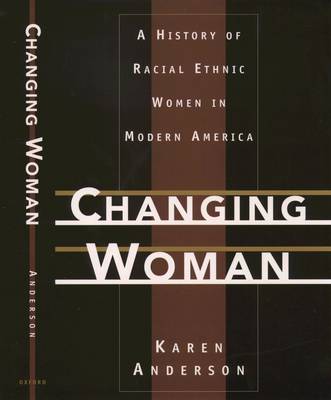
- Retrait gratuit dans votre magasin Club
- 7.000.000 titres dans notre catalogue
- Payer en toute sécurité
- Toujours un magasin près de chez vous
- Retrait gratuit dans votre magasin Club
- 7.000.0000 titres dans notre catalogue
- Payer en toute sécurité
- Toujours un magasin près de chez vous
Changing Woman
A History of Racial Ethnic Women in Modern America
Karen Anderson
Livre broché | Anglais
152,95 €
+ 305 points
Format
Description
While great strides have been made in documenting discrimination against women in America, our awareness of discrimination is due in large part to the efforts of a feminist movement dominated by middle-class white women, and is skewed to their experiences. Yet discrimination against racial ethnic women is in fact dramatically different--more complex and more widespread--and without a window into the lives of racial ethnic women our understanding of the full extent of discrimination against all women in America will be woefully inadequate. Now, in this illuminating volume, Karen Anderson offers the first book to examine the lives of women in the three main ethnic groups in the United States--Native American, Mexican American, and African American women--revealing the many ways in which these groups have suffered oppression, and the profound effects it has had on their lives.
Here is a thought-provoking examination of the history of racial ethnic women, one which provides not only insight into their lives, but also a broader perception of the history, politics, and culture of the United States. For instance, Anderson examines the clash between Native American tribes and the U.S. government (particularly in the plains and in the West) and shows how the forced acculturation of Indian women caused the abandonment of traditional cultural values and roles (in many tribes, women held positions of power which they had to relinquish), subordination to and economic dependence on their husbands, and the loss of meaningful authority over their children. Ultimately, Indian women were forced into the labor market, the extended family was destroyed, and tribes were dispersed from the reservation and into the mainstream--all of which dramatically altered the woman's place in white society and within their own tribes. The book examines Mexican-American women, revealing that since U.S. job recruiters in Mexico have historically focused mostly on low-wage male workers, Mexicans have constituted a disproportionate number of the illegals entering the states, placing them in a highly vulnerable position. And even though Mexican-American women have in many instances achieved a measure of economic success, in their families they are still subject to constraints on their social and political autonomy at the hands of their husbands. And finally, Anderson cites a wealth of evidence to demonstrate that, in the years since World War II, African-American women have experienced dramatic changes in their social positions and political roles, and that the migration to large urban areas in the North simply heightened the conflict between homemaker and breadwinner already thrust upon them.
Changing Woman provides the first history of women within each racial ethnic group, tracing the meager progress they have made right up to the present. Indeed, Anderson concludes that while white middle-class women have made strides toward liberation from male domination, women of color have not yet found, in feminism, any political remedy to their problems.
Here is a thought-provoking examination of the history of racial ethnic women, one which provides not only insight into their lives, but also a broader perception of the history, politics, and culture of the United States. For instance, Anderson examines the clash between Native American tribes and the U.S. government (particularly in the plains and in the West) and shows how the forced acculturation of Indian women caused the abandonment of traditional cultural values and roles (in many tribes, women held positions of power which they had to relinquish), subordination to and economic dependence on their husbands, and the loss of meaningful authority over their children. Ultimately, Indian women were forced into the labor market, the extended family was destroyed, and tribes were dispersed from the reservation and into the mainstream--all of which dramatically altered the woman's place in white society and within their own tribes. The book examines Mexican-American women, revealing that since U.S. job recruiters in Mexico have historically focused mostly on low-wage male workers, Mexicans have constituted a disproportionate number of the illegals entering the states, placing them in a highly vulnerable position. And even though Mexican-American women have in many instances achieved a measure of economic success, in their families they are still subject to constraints on their social and political autonomy at the hands of their husbands. And finally, Anderson cites a wealth of evidence to demonstrate that, in the years since World War II, African-American women have experienced dramatic changes in their social positions and political roles, and that the migration to large urban areas in the North simply heightened the conflict between homemaker and breadwinner already thrust upon them.
Changing Woman provides the first history of women within each racial ethnic group, tracing the meager progress they have made right up to the present. Indeed, Anderson concludes that while white middle-class women have made strides toward liberation from male domination, women of color have not yet found, in feminism, any political remedy to their problems.
Spécifications
Parties prenantes
- Auteur(s) :
- Editeur:
Contenu
- Nombre de pages :
- 304
- Langue:
- Anglais
Caractéristiques
- EAN:
- 9780195117882
- Date de parution :
- 24-07-97
- Format:
- Livre broché
- Format numérique:
- Trade paperback (VS)
- Dimensions :
- 156 mm x 234 mm
- Poids :
- 430 g

Les avis
Nous publions uniquement les avis qui respectent les conditions requises. Consultez nos conditions pour les avis.






